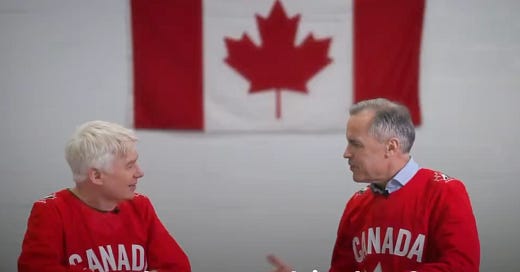A show about nothing
In the span of mere weeks, Donald Trump completely transformed Canada's political dynamic — and improbably gave technocratic politics a second wind.
For the past few weeks, I’ve been making the rounds on various shows and podcasts to talk about Canada’s ongoing federal election — to be held a week from today at time of writing. The volume of words I’ve produced, both written and spoken, has been greater than for any other topic. In fact, it’s been years since I’ve written so much about Canadian politics in such a short time.
Six days before the election, however, I find myself with little left to say.
A few months ago, it momentarily seemed like Canada was entering a period of political and ideological ferment of the kind that sometimes precedes a fundamental realignment. This may still end up being the case. But, if so, there have been very few signs of it in the current federal campaign. Doubtless, the ground has shifted rapidly beneath our feet — in fact, I can’t recall another instance of the political winds shifting so suddenly. By all appearances, however, the implications have ultimately been small-c conservative.
If the polls are to be believed, Canada will emerge from the 2025 election with a centre-right government whose idea of nation-building amounts to a business friendly program of publicly-financed private development, tax cuts, and a more polite version of austerity. This is frustrating in and of itself. But it’s in some ways more frustrating that the Carney-led Liberals have been able to campaign on such an agenda without large swathes of the electorate even really seeming to notice. Next week, it’s quite probable several million progressively-minded Canadians will enthusiastically cast their ballots for Liberal candidates without even realizing they’re, in all likelihood, voting for a fiscally conservative administration likely to make significant cuts to vital national programs. In effect, Carney is running against not only the Conservatives and the NDP, but also the modestly centre-left bent of Trudeau-era liberalism.
Partly thanks to its electoral system, Canada’s elections have always somewhat frustratingly played out at the level of meta-narrative. But, in this case, a kind of comforting national fable has come to overshadow almost everything else — transcending age, region, even ideology. It’s a fable of competent management divorced from policy specifics; of unity achieved through slogans and nostalgia rather than tangible changes in how the country and its institutions operate; of a system in turmoil that can magically be fixed by the very class of people most implicated in its design.
For virtually the whole of my professional life, I’ve been writing about the fallacies and illusions of the political centre. Most often, the main characters have been charismatic politicians more conservatively-minded than their liberal rhetoric lets on. Rarely, however, have they been figures like Mark Carney — for whom managerial blandness is more or less the point. As I’ve written elsewhere, Carney is certainly not without political skill. For a politician who most often talks like he’s chairing a board meeting, he has ultimately proven quite adept at sounding normal and projecting authenticity when appearing on The Daily Show or being interviewed by Nardwuar.
Nonetheless, it’s striking that the main Liberal message in the campaign’s final week is the one found in the ad below:
Contra Obama in 2008 or Trudeau in 2015, this is an appeal to elite expertise and steady hands at the wheel. It can’t be called fake populism because there’s no hint of populism to be had in the first place. Strikingly, however, it’s precisely this quality that’s become central to Carney’s appeal. Since 2008, “trust a banker to sort things out” has rarely resonated with the average voter in North America or Europe, whatever their political orientation. In the Canada of 2025, however, it seems to be exactly what between 40-50% of the electorate wants to hear.
Thanks to Donald Trump, this election quickly became something very different from the one most of us have been anticipating for the past two or three years. Conducted largely in his shadow, however, the upshot has been a campaign in which the most conservative instincts in the Canadian psyche have come to predominate.
Back in February, I concluded a piece about the limitations of Carney-ism with the following:
One of the ironies and paradoxes of a moment like our own is that political uncertainty and systemwide failure often foster timidity, inspiring the retrenchment of our political horizons rather than their expansion. Anxiousness and uncertainty make novelty and risk-taking appear less, not more attractive, and the seductions of technocratic politics consequently increase even as the solutions they offer become less adequate to the task at hand. Carney’s apparent rise in Canadian politics reflects both the frustrating minimalism of our political class and the particular appeal of his message in a troubled and unsettling time many are understandably keen to escape.
I obviously don’t know where things will fall come election day. Nonetheless, I don’t think I could possibly have imagined the extent to which the above would turn out to be true.





I basically agree with all this, but I'm somewhat less despondent. I voted NDP in a district where they're competitive with the Tories, and I've never voted before. It's possible that there are others like me who are being brought into the political process for the first time whose preferences aren't being reflected in polls. We'll find out soon enough.
I'm also relieved that we're on course to avoid a Conservative majority. A Rothbard acolyte like Poilievre would in my view have been the death knell of Canada's modest social democracy. My sense is that the impact of a Carney government would be less terminal for things I believe in, so I'm not entirely in despair.